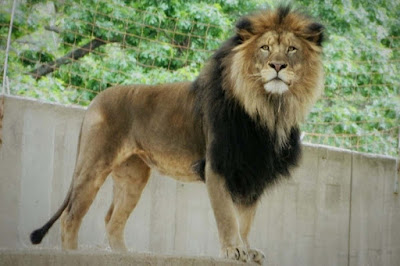 |
| Big cats have tested positive for the coronavirus before, but this is the first known case of a lion probably transmitting the infection to zoo workers James Ahmed / EyeEm/Getty Images |
A lion that was infected with the coronavirus probably passed it on to two zoo employees, researchers have said in a new paper. Viral samples collected from the animal and the two workers were identical, with contact tracing suggesting the employees didn’t catch the infection in any other way.
Previous studies suggest that the SARS-CoV-2 coronavirus has been passed from people to animals, such as their pets, and from animals like minks, domestic cats and hamsters to people. Animal-to-human transmission is considered to be rare, however, and hadn’t previously been documented in a zoo setting.
Now, Audrey Siegrist at Potawatomi Zoo in South Bend, Indiana, and her colleagues have reported how a lion at the zoo is strongly suspected to have infected two employees.
The 20-year-old lion was considered to be elderly and had kidney disease and spinal degeneration, which required it to be hand fed. It received two doses of a covid-19 vaccine in September and October 2021.
That December, the lion developed coronavirus symptoms, such as coughing and breathlessness. A nasal swab confirmed it had the infection.
The same day that the lion tested positive, nine employees – who were all vaccinated against SARS-CoV-2 and had entered the animal’s enclosure within 10 days of it developing symptoms – were tested for the coronavirus, all coming back negative.
But within a week of the lion testing positive, three of these employees developed symptoms, with tests then revealing they had SARS-CoV-2. All three cared for the lion in a way that brought them close to its face, such as feeding it, providing it with oral care or grooming its mane.
Whole genome sequencing of the virus isolated from the lion and two of the infected employees revealed that the viral samples were identical. The third employee’s sample wasn’t considered adequate for sequencing.
Employee contact tracing “confirmed probable lion-to-human transmission”, the researchers write.
As the zoo was closed to visitors at the end of 2021, the researchers have traced the source of the lion’s infection to another employee who cared for the animal within five days of it developing symptoms.
Speaking of the probable lion-to-people transmission, Leslie Boyer at the University of Arizona, Tucson, who was involved in the research, says: “You would have to be in very close contact with such animals to get infected. People like vets, farmers [and] zookeepers who often work close to the oral and nasal regions of these animals are most at risk to such transmission.”
To better protect these individuals, the team has called for further research to test the efficacy of covid-19 vaccines at preventing transmission from animals to people, and vice versa, as all the zoo employees and the lion had received two vaccine doses.
“Cats, including the big ones, have the same ACE-2 receptors as humans, which makes them quite vulnerable to SARS-CoV-2, and they can get very sick or even die,” says Dean Winslow at Stanford University, California. The lion was euthanised a few days after it tested positive.
“Proper ventilation in enclosures and masking up by zoo employees would prevent such interspecies disease spread,” says Winslow.
Reference:
medRxivDOI: doi.org/10.1101/2023.01.29.23285159




0 Comments